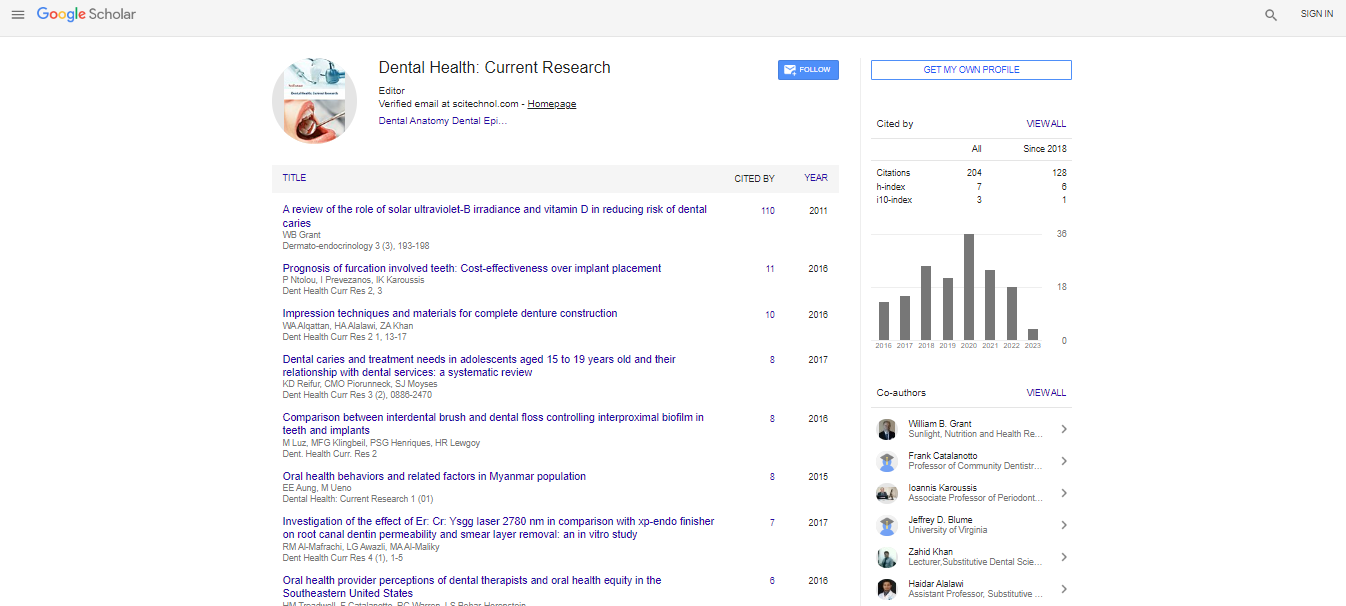Immunohistochemical expression of oxidative stress markers Keap1, Nrf2 in oral squamous cell carcinoma in relation to (angiogenesis, invasion and metastasis) assessed by VEGF C and integrin β1 in comparison to normal oral mucosa
Mustafa Gheni Taher
University of Diyala, Iraq
: Dent Health Curr Res
Abstract
Background: Oral Squamous Cell Carcinoma (OSCC) comprises about 90% of all oral cancers and it is highly lethal and disfiguring disease. Oxidative stress has been reported to play an important role and implicated in etiology of various kinds of malignancies and benefit cells through initiation, survival and progression. Keap1, Nrf2 were considered as a clue on the balance between oxidation and antioxidants mechanism inside normal and malignant cells, their clinical significance and role in biological behavior of oral squamous cell carcinoma has to be elucidated, in addition their relation to VEGF C and integrin β1 as markers of angiogenesis, invasion and metastasis has to be clarified.
Objective: Immunohistochemical evaluation of oxidative stress markers Keap1, Nrf2 and their importance in biological behavior of oral squamous cell carcinoma in comparison to normal oral mucosa and their relation to angiogenesis, invasion and metastasis assisted by VEGF C and integrin β1 and their correlation to clinicopathological parameters.
Patients & Methods: A total of 40 retrospective and prospective formalin fixed paraffin-embedded blocks of totally excised oral squamous cell carcinoma and 15 cases of normal oral mucosa were included in this study. Hematoxylin & Eosin stain was performed for each block for reassessment of histopathological examination. An immunohistochemical staining was performed using anti Keap1 polyclonal antibody, while anti Nrf2, anti VEGF C and anti-integrin β1 monoclonal antibodies were used.
Results: Female to male ratio 2.6:1 and most of the cases (42.5%) occurred in the fourth and fifth decades. No lymph node involvement was observed in 19 (47.5%) of cases. In about a quarter of cases 11(27.5%) the tumor was at Stage-I, 11 (27.5%) moderately differentiated and 7 (17.5%) were poorly differentiated carcinoma. A minimal grade of inflammatory reaction was documented in 16 (40%) of cases, while an intense grade of inflammation was observed in 5 (12.5%) of cases. All the tested tissue markers (Keap1, Nrf2, VEGF C and integrin β1) were over expressed in tumor cells comparing to normal corresponding tissue. All markers had no relations to age and gender of OSCC cases group, while only integrin β1 has statistical significant relation to tumor site were p value (0.05). VEGF C was in direct relation to tumor size (p>0.05). With tumor stage, only integrin β1 has statistically direct relationship (p>0.05). All markers had no relations neither to degree of differentiation, nor inflammatory reaction with the exception of Nrf2 marker, however which showed a statistically significant moderate positive direct linear correlation with degree of inflammatory reaction (r=0.352, P=0.02).
Conclusion: Over expression of oxidative stress Keap1, Nrf2, proteins in oral squamous cell carcinoma enhances cytoprotective effects on cancer cells and may contribute to diverse cellular functions such as differentiation, proliferation, inflammation and metastasis in oral squamous cell carcinoma. The expression of VEGF C and integrin β1 proteins in cancer cells, confirming their role, in cell adhesion, cell signaling interactions with angiogenic molecular mechanisms, to induce oral squamous cell carcinoma growth, proliferation and progression.
Biography
Mustafa Gheni Taher has completed B.D.S., University of Mosul. Later he pursued M.Sc, Ph.D. in Oral and Maxillofacial Pathology in University of Baghdad. He took diploma in professional dental implants in D.D.I. from British Academy Of Implant And Restorative Dentistry. He is currently working as assistant professor in Department Of Pathology in College of Medicine, University of Diyala, Iraq.
E-mail: mostafa.ghany@yahoo.com
 Spanish
Spanish  Chinese
Chinese  Russian
Russian  German
German  French
French  Japanese
Japanese  Portuguese
Portuguese  Hindi
Hindi 